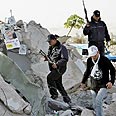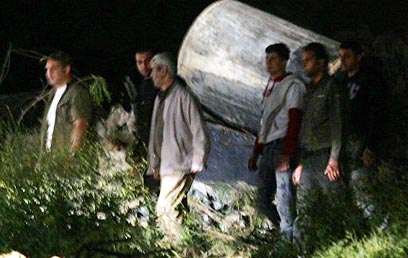
Aftermath of Jericho operation
צילום: רויטרס
Jericho raid: A new era
Prison raid reflects new Israeli attitude to Hamas-led PA; officials: Confrontation inevitable
New rules: The story of Israel's takeover of the Jericho prison last week can be viewed as a microcosm reflecting developments in the Palestinian Authority, Israel's relations with the Palestinians, and the kind of future that lies in store with a Hamas-led PA.
The decision to refrain from a full-scale raid into the prison in order to detain top detainees barricaded there and choosing instead to avoid unnecessary risks and continue to chip away at prison walls and pressing ahead with the siege, was not only a military tactic.
The operation also marked Israel's new strategy in its dealings with a Hamas-controlled Palestinian entity.
By Tuesday afternoon last week, senior officers began sensing the unpleasant reality of a dead-end at the Jericho prison. This was the nightmare scenario of commanders, namely a status-quo that leads Israel to lengthy negotiations with the barricaded detainees, as television cameras continue to roll, international pressure continues to mount, and riots threaten to erupt across the Muslim world.
The commander of the YAMAM, the police's elite counter-terrorism unit, who led the raid into the prison compound, recommended a drastic move: A forceful raid on the prison and a quick takeover of the jail using firearms in order to capture the six senior prisoners.
The chances of such move succeeding were reasonable. YAMAM fighters have been practicing on a Jericho prison model for two and a half weeks and prepared for almost every conceivable scenario.
However, the option of pressing ahead with the raid also presented the danger of Israeli casualties, and also dramatically increased the likelihood of hurting one of the top prisoners. The objective, however, was to capture them alive and bring them to justice.
Indeed, this was the request put forward by ailing Prime Minister Ariel Sharon, who at every opportunity would remind senior security officials they "owe him" a plan that would bring Minister Rehavaam Zeevi's killers to justice.
The YAMAM's commander is considered a leading expert on counter-terror operations. He can also be very persuasive when need be. Top military officials were close to accepting his recommendation, but at the last moment IDF Chief of Staff Dan Halutz decided to go ahead with the slow, safe siege.
Detainees preferred to stay alive
At that point, by late afternoon hours, the six top detainees were no longer running around the prison. To their misfortune, they were still sleeping when British prison guards left the jail at 9:30 a.m. By 10:04, YAMAM snipers were already in control of key areas of the prison courtyard.
The snipers quickly shot and killed two Palestinian police officers who opened fire. This marked the end of Palestinian police resistance to the operation.
Once the top detainees, headed by PFLP Secretary-General Ahmad Saadat, realized the Brits were no longer around, they left their prison wing and began moving around the building. Officials feared they may deliver on their pledge to fight to the bitter end.

Saadat surrenders – detainees didn't want to fight (Photo: AFP)
The detainees had the opportunity to do so had they wanted to. At that point they even had access to Palestinian police weapons. Moreover, they were not the only ones who had a good reason to fight back. Prisoners at the jail included wanted suspects involved in the lynching of two IDF soldiers in Ramallah at the beginning of the intifada. They knew that should they be nabbed, they would be sent to life in prison in an Israeli jail – under vastly different conditions than those they enjoyed at the Jericho prison.
As it turned out, no one there intended to offer a serious fight. Apparently they did not wish to become martyrs.
Two hours before surrendering, the only place left standing at the prison was the same wing the top detainees were confined to. They promptly returned to their rooms and waited. At 6:50 p.m., when the walls around them started shaking, they stepped out and surrendered.
Inevitable clash
During defense establishment consultations regarding the operational plans to take over the prison, military issues were discussed along with political consequences, as is the norm in such operations. However, this time around, the "political chapter" was pushed to the margins and its effect on the operation was minimal.
The raid in Jericho marked a turning point in terms of the importance attached by Israel to the Palestinian Authority's stability. The operation's effect on the leadership of PA leader Mahmoud Abbas did not interest anyone. This pattern will likely be repeated in Israel's dealings with the PA in the future.
Indeed, political considerations are now likely to take a back seat in favor of security considerations. Up until now, the division was approximately fifty-fifty. Military officials admit the new situation is more convenient for the army.
This change will affect first of all the scope of operational activity and judgment. If the army would like to assassinate someone, it will. If it would see fit to bomb, it will. If military officials wish to invade Gaza, they will do that too. The army now feels the constraints it has been facing have been removed.
The Jericho operation signals that Israel is not only willing to stand up for itself when it comes to national principles, but that Israel is also willing to "break the rules" should it see fit.
Defense officials sense that Israel is headed for an unavoidable clash with the PA. They are not certain whether it will happen in May, June, or July, but they know it will happen. Unilateral moves will become the name of the game. There will be no dialogue with the other side.
However, the Jericho raid also reflected developments in the post-elections Palestinian Authority. Palestinian police officers at the prison, closely monitored by Israel throughout the operation, displayed two noticeable characteristics. For one thing, they showed a clear lack of desire to fight back and die. Yet they also displayed a lack of desire to leave the scene, flee, or surrender, for fear they will be seen as collaborators with the Jewish State.
Israeli officials are already feeling the declining level of dialogue between IDF officials and their Palestinian counterparts. The two sides still talk, but the Palestinian willingness to uncover explosive devices and prevent terror attacks is evaporating.
Restraint will end sooner or later
Meanwhile, external forces are pushing the Palestinians to resort to violence. The Syrians, Iranians, and the Hizbullah are pressing the Islamic Jihad and Fatah to carry out attacks. A day after the Jericho operation, security authorities were presented with a report warning of 40 terror cells preparing to carry out attacks and four concrete attacks in the works.
None of those attacks, by the way, were attributed to Hamas, but rather, to the Fatah or Jihad. Each one is a suicide attack meant to cause mass casualties. According to security officials, the Hamas "continues to restrain itself" and hopes to gain some time to form a government and take over the PA.
"However, Hamas is already done with biting its nails in its effort to remain restrained. At this point it's already biting its fingers," officials say.
However, this restraint will come to an end, sooner or later. The Jericho operation did not boost Hamas' prestige. The only response it offered as the governing party was the organization of mass demonstrations. The Jihad and Fatah, meanwhile, are doing everything to draw Hamas into the cycle of violence.
The continued Qassam fire will eventually lead to Israeli casualties. Israel, in turn, does not intend to respond in the same measured manner it did in the past. This may lead to a reckless response by Hamas.
Overall, the Jericho prison raid settled the score with the killers of Minister Zeevi, yet it also opened a new chapter - with numerous unknowns - in the relationship between Israel and the Hamas-led PA.
Story first appeared in Israel's leading newspaper Yedioth Ahronoth










